Affiliate links on Android Authority may earn us a commission. Learn more.
Google Pixel 4a vs OnePlus Nord: Which should you buy?
Published onJanuary 26, 2021
The budget smartphone market has become incredibly competitive over the past year or so thanks to ever-climbing flagship prices. Two of the hottest options on the block right now are the Google Pixel 4a and the OnePlus Nord.
The former utilizes software to the fullest to get the most out of its limited hardware, while the latter relies more on specs to get the job done. Two completely different approaches to a mid-range smartphone, but which one comes out on top?
Find out in Android Authority’s Google Pixel 4a vs OnePlus Nord hands-on comparison.
Read the full reviews: Google Pixel 4a review | OnePlus Nord review
Google Pixel 4a vs OnePlus Nord
Specs
| Google Pixel 4a | OnePlus Nord | |
|---|---|---|
Display | Google Pixel 4a 5.81-inch OLED 2,340 x 1,080 resolution 19.5:9 aspect ratio Gorilla Glass 3 | OnePlus Nord 6.44-inch Fluid AMOLED 2,400 x 1,080 20:9 aspect ratio 90Hz refresh rate In-display fingerprint sensor Corning Gorilla Glass 5 |
Processor | Google Pixel 4a Qualcomm Snapdragon 730G 2x Cortex-A76 6x Cortex-A55 Adreno 618 | OnePlus Nord Qualcomm Snapdragon 765G Adreno 620 |
RAM | Google Pixel 4a 6GB RAM | OnePlus Nord 8GB / 12GB LPDDR4X |
Storage | Google Pixel 4a 128GB No microSD slot | OnePlus Nord 128GB / 256GB UFS 2.1 |
Cameras | Google Pixel 4a Rear: 12.2MP, f/1.7, 1.4µm pixels, optical + electronic image stabilization Front: 8MP sensor, f/2.0, 1.12µm pixels, fixed focus, 84-degree field-of-view | OnePlus Nord Rear: - 48MP main (f/1.75, 0.8µm) - 8MP ultra-wide (f/2.25, 119 degrees) - 5MP depth (f/2.4) - 2MP macro (f/2.4) Front: - 32MP main (f/2.45, 0.8µm) - 8MP ultra-wide (f/2.45, 105 degrees) |
Battery | Google Pixel 4a 3,140mAh 18W charging No wireless charging | OnePlus Nord 4,115mAh Warp Charge 30T (5V/6A) No wireless charging |
IP Rating | Google Pixel 4a No IP rating | OnePlus Nord None |
Software | Google Pixel 4a Android 10 | OnePlus Nord OxygenOS 10.5 Android 10 |
Colors | Google Pixel 4a Just Black | OnePlus Nord Gray Onyx Blue Marble |
Dimensions and weight | Google Pixel 4a 144 x 69.4 x 8.2mm 143g | OnePlus Nord 158.3 x 73.3 x 8.2mm 184g |
Design and display
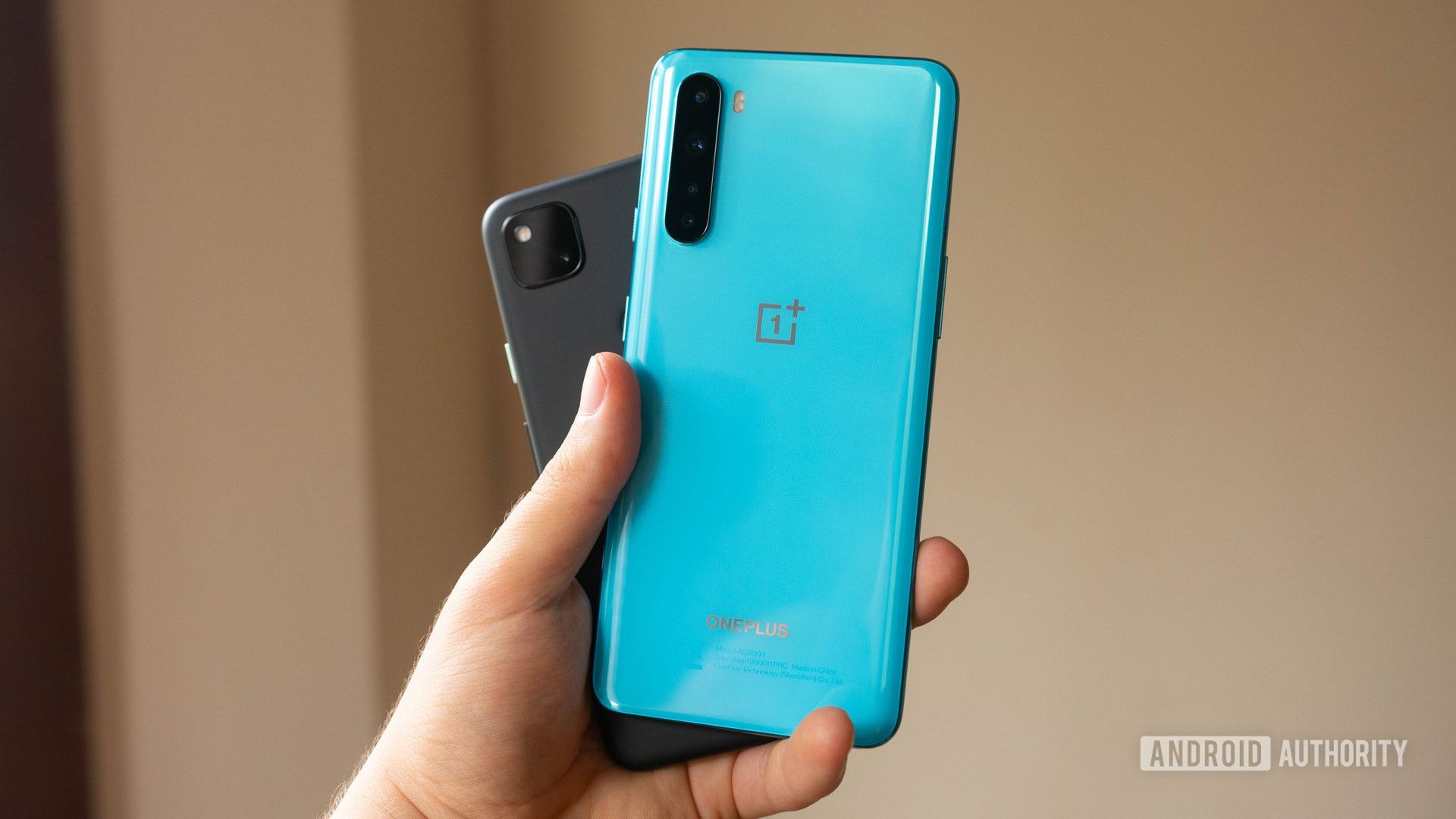
The designs of these smartphones are vastly different. The OnePlus Nord has Gorilla Glass 5 on both front and back with a plastic rail around the outside. The power button is on the right and the volume rocker is on the left. OnePlus’ signature mute toggle switch also resides on the right-hand side. The USB-C port is rated at 2.0 speeds and the optical in-display is faster than most other mid-range phones.
The most striking part of the design of the model I’ve been using is the Blue Marble colorway, which really pops in certain lighting conditions. It looks even more dramatic in person, though there’s also a far more muted Gray Onyx option too. The phone feels premium in the hand and a lot like a flagship thanks to its tapered glass back and large size.
The OnePlus Nord looks and feels more like a flagship.
Comparatively, the Pixel 4a feels “cheaper” with its full polycarbonate build. However, its buttons — which are all on the right-hand side — feel crisper and more tactile. The single black color is a bit boring but isn’t offensive to look at by any means. The Pixel 4a’s USB-C port is rated at 3.1 speeds and there’s even a headphone jack at the top.
The device’s haptics are also more impressive than the Nord’s. The rear capacitive fingerprint scanner is faster and more accurate than the Nord’s in-display reader and can be used to pull down the notification shade. Its single punch hole is also smaller than the Nord’s double punch hole as it’s only housing a single camera. However, the bezels are ever so slightly thicker on the Pixel 4a.
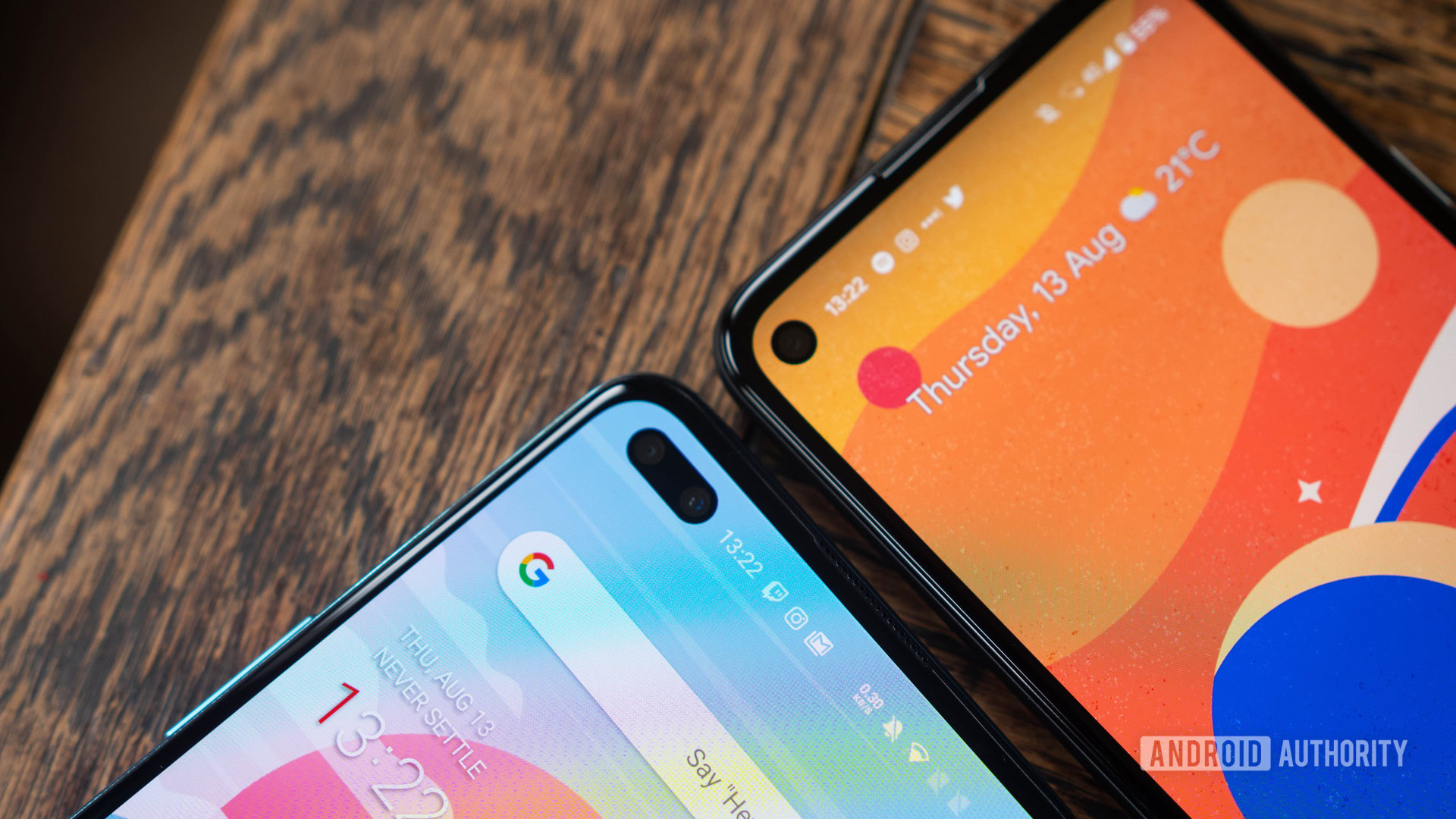
On paper, the Pixel 4a’s 5.81-inch 60Hz display shouldn’t be as impressive as the Nord’s 6.44-inch 90Hz panel.
Instead, the Pixel 4a’s panel came out as the better of the two in our display testing. It has better color accuracy and is more precisely calibrated than the Nord’s panel. In everyday use, it doesn’t make a major difference to the user experience, but holding both devices side by side shows the discrepancies in image quality between the two.
What does make a difference is the OnePlus Nord’s higher refresh rate display which, when combined with the increased screen real estate, help the device feel smoother, snappier, and more like a flagship phone.
The form factor is the biggest difference between these two phones. Even if you’re not so concerned with aesthetics, the OnePlus Nord is a significantly larger device than the Pixel 4a. Those after a more compact phone may want to opt for Google’s budget handset.
Performance, battery life, and software
Unsurprisingly, the OnePlus Nord’s more powerful Snapdragon 765G handily beat out the Pixel 4a’s 730G in our testing. Between the impressive raw performance, faster display, and snappier animations in OxygenOS, the OnePlus Nord feels a lot quicker under the finger than the Pixel 4a. Just flicking between apps, the Nord is noticeably faster.
The story continues for gaming. The Snapdragon 765G’s more powerful Adreno 620 GPU makes short work of 2D games and runs some 3D titles at 90fps. The Nord struggles with more graphically intensive games such as Fortnite and PUBG Mobile, though both are still playable. The Pixel 4a doesn’t cope quite as well. Gameplay is less immersive with more frequent hangs and lagging due to its weaker chipset.
With all that said, the Pixel 4a is still a very capable performer and a significant upgrade over its predecessor. Check out our Pixel 4a performance deep dive below for more.
Read more: Is the Google Pixel 4a powerful enough for a budget phone in 2020?
As for software, picking between the Nord’s OxygenOS and Google’s Pixel Experience will come down to personal preference. Both are very clean versions of Android 10 and Android 11. Similarly, both companies support have impressive track records with updates and version upgrades. You would expect this from Google, of course, but OnePlus is one of the best out there for long-term software support. OxygenOS is the more feature-rich of the two with a wide variety of customization options that look set to expand further when OxygenOS 11 rolls out.
However, Pixel Experience does more with the hardware that it’s running on. It manages to make a Snapdragon 730G feel almost as smooth as the more powerful 765G in basic tasks. The Pixel 4a also processes images faster than the OnePlus Nord in our testing while also besting it in image quality thanks to Google’s celebrated computational photography smarts (more on this later). Pixel Experience also maximizes battery life by culling background tasks and adds in handy features like Now Playing, which detects ambient music and displays the title and artist on the lock screen.
Picking between OxygenOS and Pixel Experience will come down to personal preference.
The OnePlus Nord’s battery may be larger than the Pixel 4a’s cell, but Google’s budget phone wasn’t far behind the Nord in our Speed Test G battery tests. This is likely due to the Pixel 4a’s less power-hungry chipset and Google’s battery software optimizations. Thankfully, both devices will give you all-day battery life as long as you’re not a power user.
The Pixel 4a can’t compete with the OnePlus Nord on charging, however. The Warp Charge 30T standard took the Nord from 0-100% in just 57 minutes in our tests vs the 87 minutes it took to recharge the Pixel 4a with its maximum supported 18W charger.
Camera
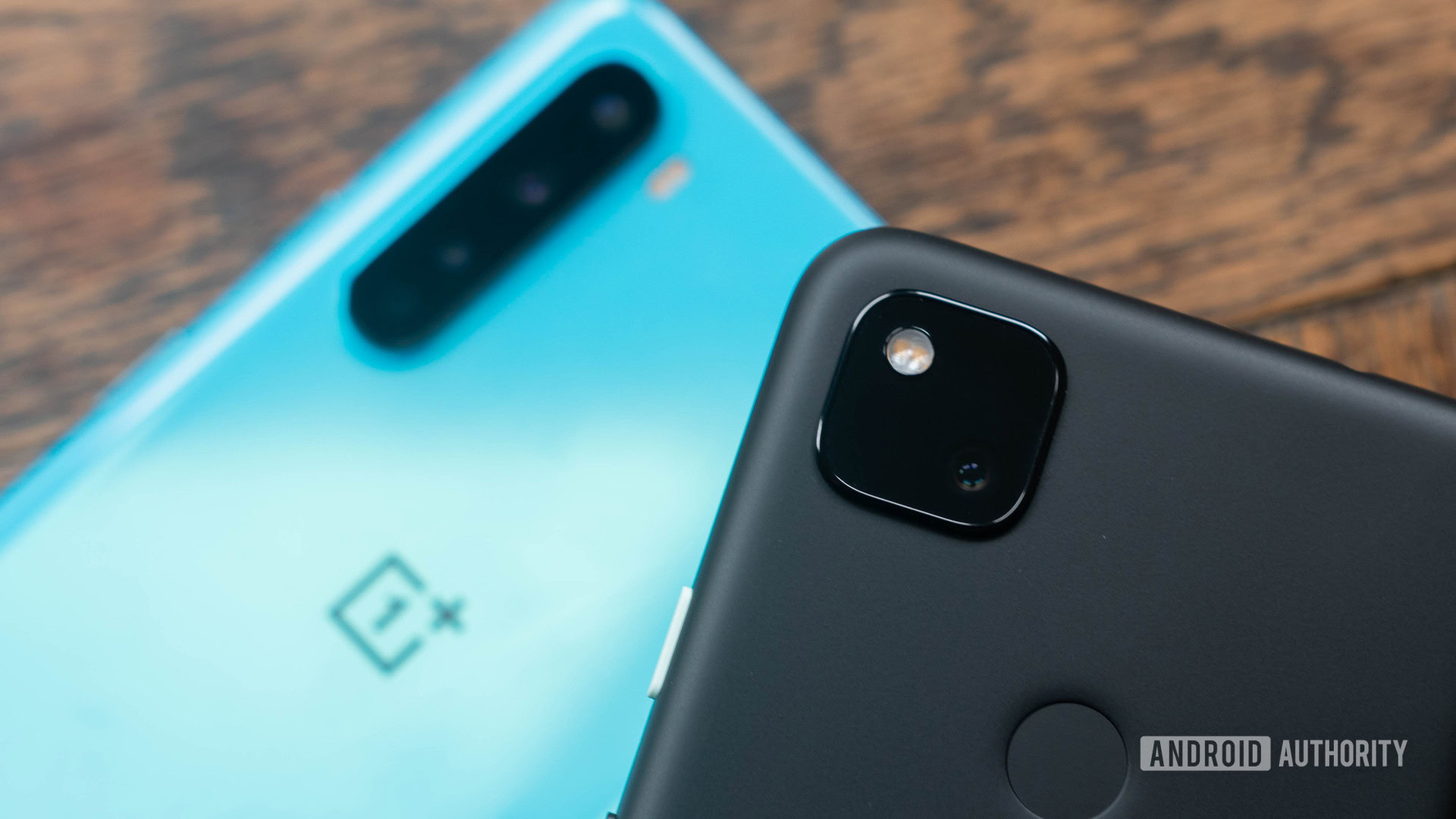
We’ve been testing the Pixel 4a against the OnePlus Nord for a full shootout contest and it’s perhaps not all that surprising that the Pixel 4a came out on top overall. Despite having only a single rear sensor, there’s no denying that the Pixel 4a’s main shooter takes the best photos of any mid-ranger, let alone just the OnePlus Nord.
When compared to the Nord, the Pixel 4a camera is sharper, captures much more dynamic range, and produces much more accurate colors.
The OnePlus Nord tends to add a lot of contrast to its images and doesn’t gather much detail in the shadows. The Pixel 4a, on the other hand, gathers that shadow detail and captures excellent dynamic range. You’ll notice that the Pixel 4a leans towards a cooler white balance which is more realistic of the actual test conditions. The Nord’s images pop more, but the Pixel 4a’s images are the most lifelike.
Indoors, the OnePlus Nord captures more light which makes sense given its larger sensor. The Pixel 4a in photo mode does a better job of denoising images, however. Again, the Pixel’s colors look far more true to life than the Nord’s which are rather washed out by comparison. Moving to outdoor light, the OnePlus Nord now captures more saturated colors at the expense of realism. The Pixel 4a’s images, while more “bland” are closer to what you’d see in real life. The shot of the leaves is a perfect example of this.
Neither device takes amazing selfies. As you can see here, the OnePlus Nord does a lot of skin smoothing and its overall exposure is very dark in low-light. The Pixel does more with the amount of light that is given. In selfie portrait mode, the Pixel 4a’s edge detection is far better than the Nord and the focus roll-off is more realistic. In both good light and low light, the Pixel 4a better handles shadows and highlight roll-off.
Both devices support portrait mode on both humans and objects. In portrait mode, the Pixel 4a crops in more than the Nord in order to emulate a true portrait lens. This results in a more pleasing and realistic bokeh mode, but means that you have to step further back to get the same framing. Its focus roll-off is rather harsh compared to the OnePlus Nord, though. Both phones do a good job with these fairly complex scenes, though I’d call the Pixel 4a the winner in this category.
Neither device has any kind of dedicated zoom lens, but that didn’t stop us trying the zoom function anyway! When zooming in 5x, both are surprisingly sharp. However, the OnePlus Nord adds a lot of sharpening when processing the image which results in too much contrast around the detailed areas.
The Pixel 4a remains sharp in a more natural way without any kind of harsh jagged lines in the wood on this telegraph pole. The Pixel 4a also captures more dynamic range, as illustrated in the shot of the telegraph pole. The OnePlus Nord is doing something strange with the colors and white balance as it tries to focus on the pole itself. whereas the Pixel 4a’s shot looks more natural.
Both smartphones have their own versions of night mode. The Pixel has Night Sight, and the OnePlus has Night Shot. In these early morning photos of the side of my house, the Pixel 4a captures far more detail in the pebble dashing and the sky. The OnePlus Nord’s Night Shot image has more noise reduction applied which results in a smeary final product. In the shots of the salt and pepper shakers and the Lego minifig, the Pixel 4a manages to capture a lot more detail in the shadows. You can read almost every word on those shakers in the Pixel 4a’s image, whereas the OnePlus Nord’s image has too much contrast. The Pixel 4a takes the win, no question.
The OnePlus Nord has the ability to zoom out to an ultra-wide where the 4a doesn’t. However, the quality of that ultrawide camera is rather questionable. The OnePlus Nord also has a 2MP macro camera which whilst handy for a handful of moments, is very soft and doesn’t capture much dynamic range. The Nord’s rear depth camera doesn’t seem to aid much in portrait mode, either.
The Nord is also able to shoot in more modes with its far more comprehensive camera app. However, its image processing is slower and not as high quality as the Pixel 4a’s more simplistic app. Overall, the Google Pixel 4a has a much better camera.
More camera shootouts:
- Google Pixel 4a vs Pixel 4 camera shootout: Budget vs flagship
- Google Pixel 4a vs Pixel 3a camera shootout: Is it worth the upgrade?
- OnePlus Nord vs iPhone SE camera shootout: Which is better?
How do the prices compare?
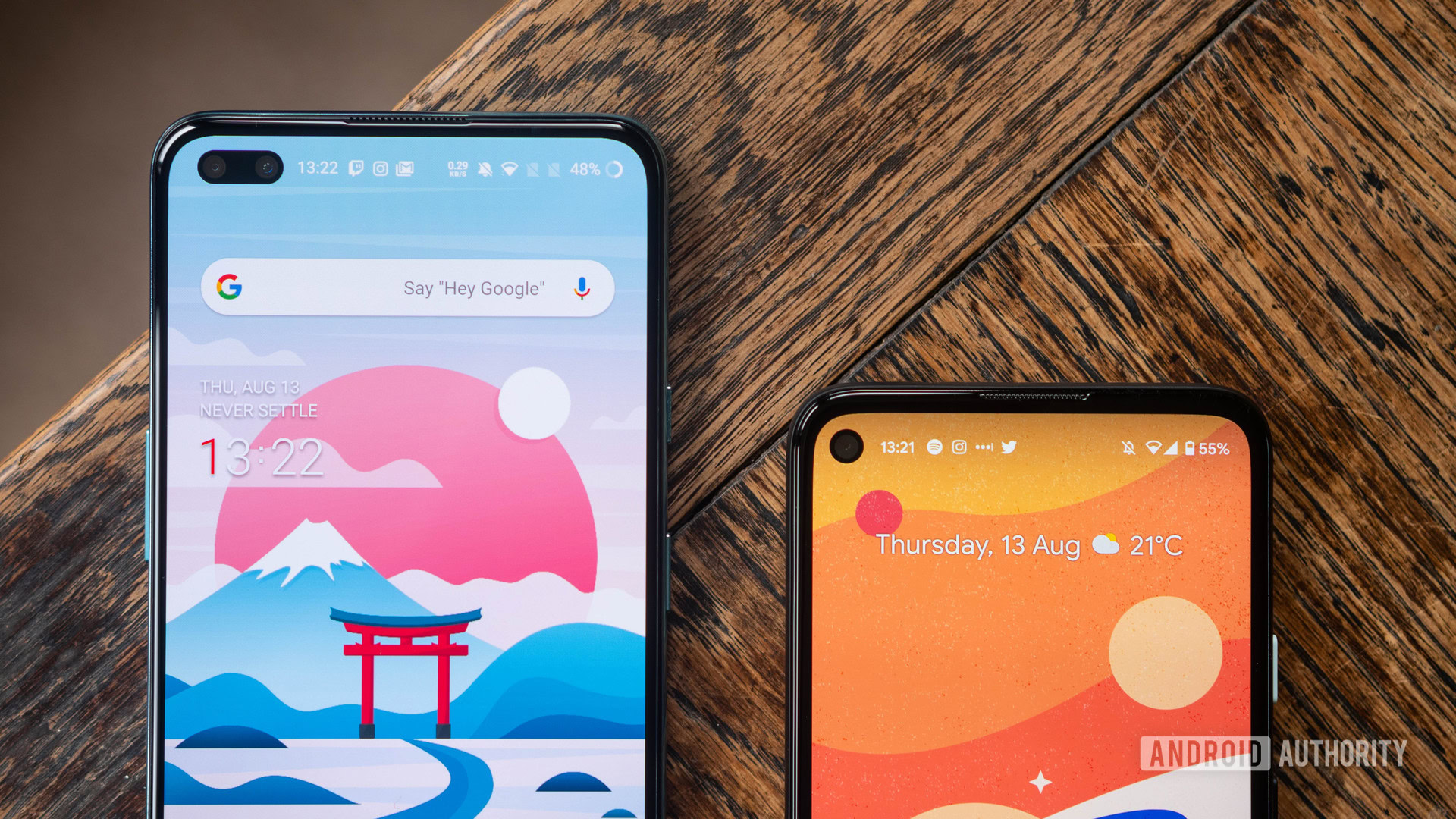
The Pixel 4a is available at €349 throughout Europe (aside from Italy and Spain, in which it is €389), $349 in the US, and 26,290 rupees in India.
- Google Pixel 4a with 6GB RAM+128GB storage: $349/£349/€349/26,290 rupees
The OnePlus Nord, on the other hand, is available in Europe and Asia, with no plans to bring it to the US.
- OnePlus Nord with 6GB RAM+64GB storage: 24,999 rupees (India exclusive)
- OnePlus Nord with 8GB RAM+128GB storage: £379/€399/27,999 rupees
- OnePlus Nord with 12GB RAM+256GB storage: £469/€499/29,999 rupees
This means that in the US at least, you only have one option — the Google Pixel 4a.
Google Pixel 4a vs OnePlus Nord: Which should you buy?
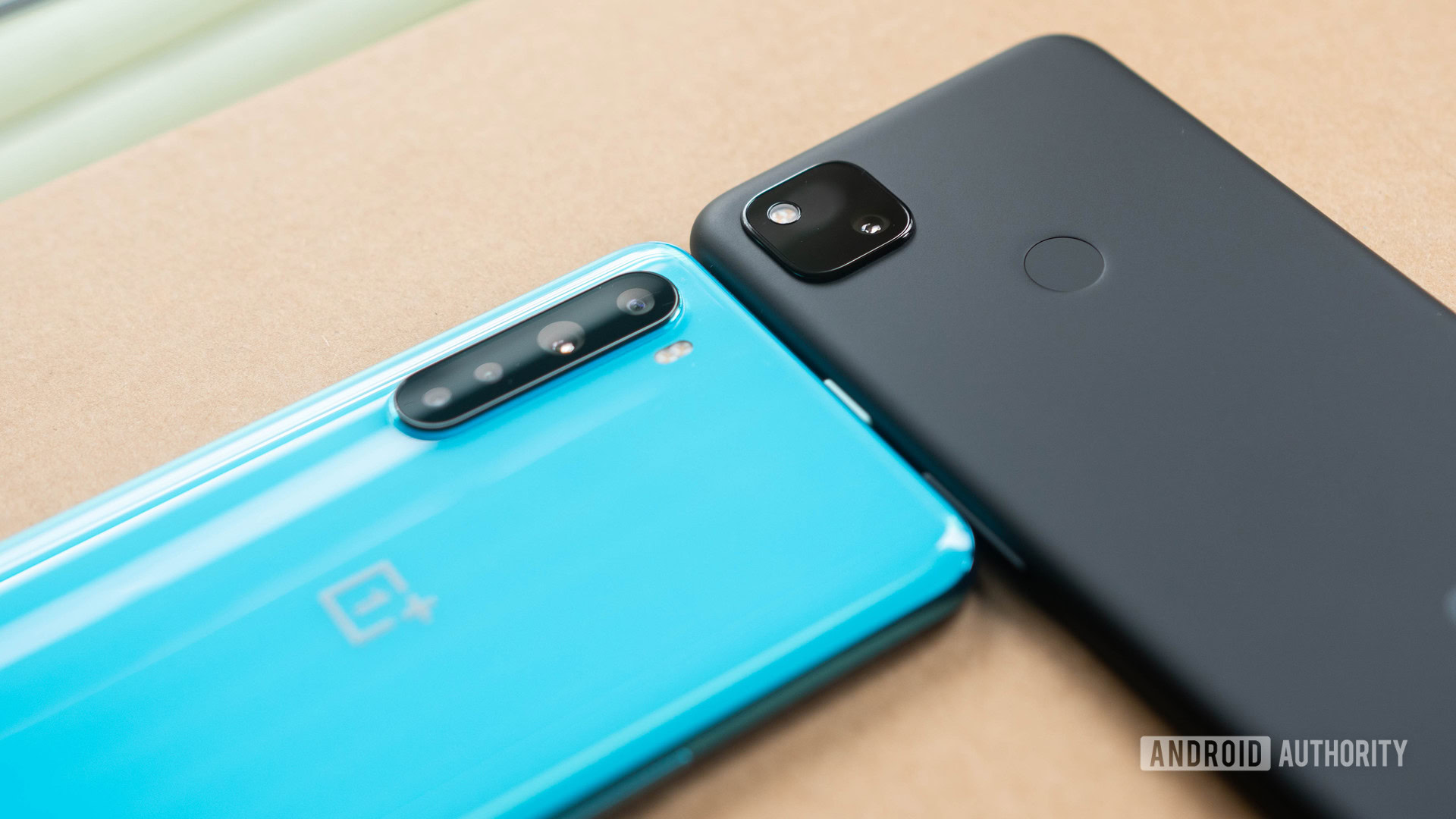
The Google Pixel 4a and OnePlus Nord are both great smartphones, so your purchase decision comes down to personal preference.
If you judge a phone on a specs sheet or the number of things it can do, the OnePlus Nord certainly gives you the most for your money. You get six cameras, a faster user experience, smoother gaming, faster charging, and a bigger battery. OxygenOS is fantastic and runs just as well on OnePlus’ mid-ranger as it does on the OnePlus 8 series.
Related: Pixel 4a vs older Google phones: Should you upgrade?
However, if you want a simple phone that nails the basics, the Google Pixel 4a is a masterpiece of essential smartphone design. It’s also far more widely available, which may be the biggest deciding factor!
The final choice between the Google Pixel 4a vs OnePlus Nord is down to you. Which budget phone would you buy?